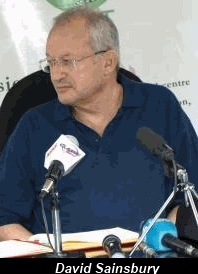|
News & Views item - October 2011 |
![]() Cambridge to Vote This Weekend on Who
Will Be Its Next Chancellor. (October 13, 2011)
Cambridge to Vote This Weekend on Who
Will Be Its Next Chancellor. (October 13, 2011)
With the resignation of the Duke of Edinburgh as chancellor of the University of Cambridge, he having reached 90, the university's administration has chosen Lord Sainsbury as its preference to take over the chancellorship. However, three others are also challenging for the position, namely Michael Mansfield, Brian Blessed and Abdul Arain.
Members of the Senate will vote on October 14-15 on who will succeed the Duke of Edinburgh as chancellor. The Senate of the University of Cambridge consists of holders of any Doctor's degree of the University, any Master's degree of the University, or the degree of Bachelor of Divinity of the University, and all current members of the Regent House.
 It'll
be recalled that from July 1998 to November 2006
David Sainsbury served as Minister for Science in the Blair
Government. At the time of his resignation the journal Nature noted
that scientists and academics praised Lord Sainsbury for championing science and
opined his success was founded on winning the trust and respect of the
scientific community.
It'll
be recalled that from July 1998 to November 2006
David Sainsbury served as Minister for Science in the Blair
Government. At the time of his resignation the journal Nature noted
that scientists and academics praised Lord Sainsbury for championing science and
opined his success was founded on winning the trust and respect of the
scientific community.
And as a parting comment Lord Sainsbury observed: "We can now point to the fact that our universities are, on all measures of innovation whether it is patents, spin-off companies or licences, producing a level of performance as good as in America. This is a major change from our past history, which has been to be good at discovery, but not good at turning this into new products and services."
Which brings us to an interview that the possible successor to Prince Phillip as chancellor of Cambridge gave to Simon Baker of Times Higher Education this week.
The [present] government is making a serious error in pursuing the impact element of the research excellence framework and risks a resulting "misallocation" of science funding. [To emphasise impact is] totally to misunderstand [the point of basic research].
I think the coalition is making a mistake -- which I have to say tended to be made by the Labour Party -- which is to think the way you get innovation is [by] putting a heavy emphasis on impact. this is totally to misunderstand what you should be doing.
In the former science minister's view it made no sense to ask people doing basic research to say exactly what would be the impact of their work "because usually you don't know".
Lord Sainsbury went on to warn against any artificial attempt to concentrate research in a few universities. In his view research councils should be left alone to fund the best research projects: "I suspect if you just let that happen naturally you may get a bit more concentration, but I don't think you have to steer it in any way."
He also told Mr Baker that politicians should be thinking more about how to "nurture universities rather than... laying lots of society's ills at their feet" adding that it was "nonsense" to suggest that universities such as Cambridge discriminated against state school pupils.
_______________________________________________
David Sainsbury retains a large shareholding in his family's Sainsbury's supermarket chain and has a personal fortune estimated to be £1.6 billion. He took History and Psychology at King's College, Cambridge then an MBA from Columbia University.